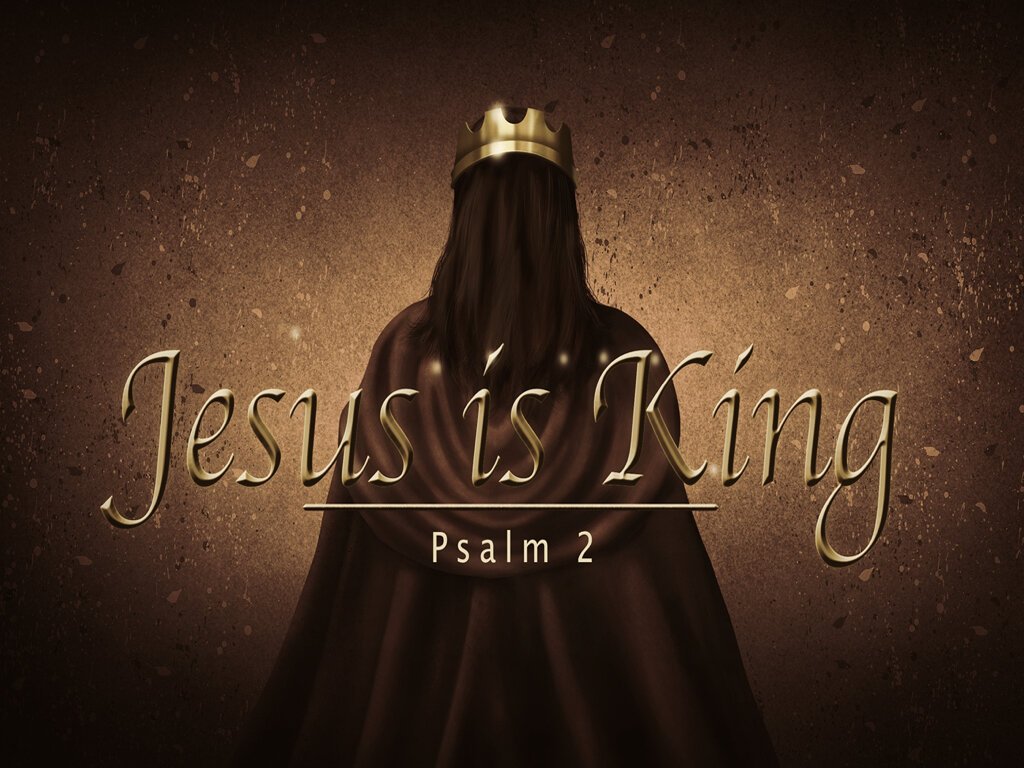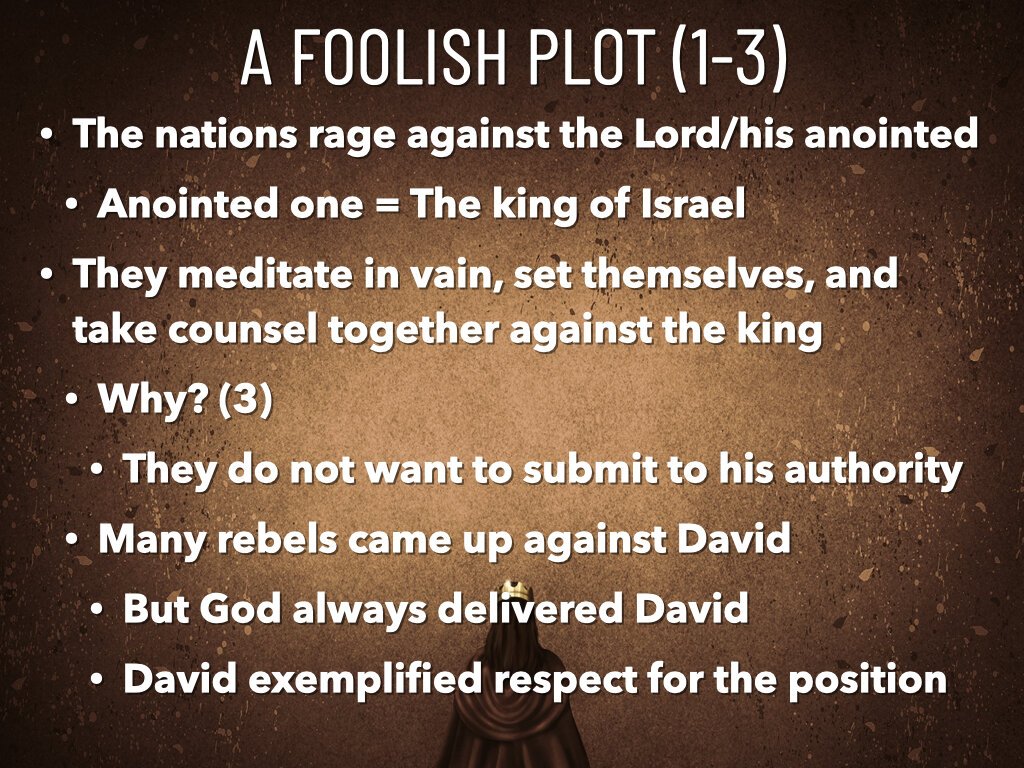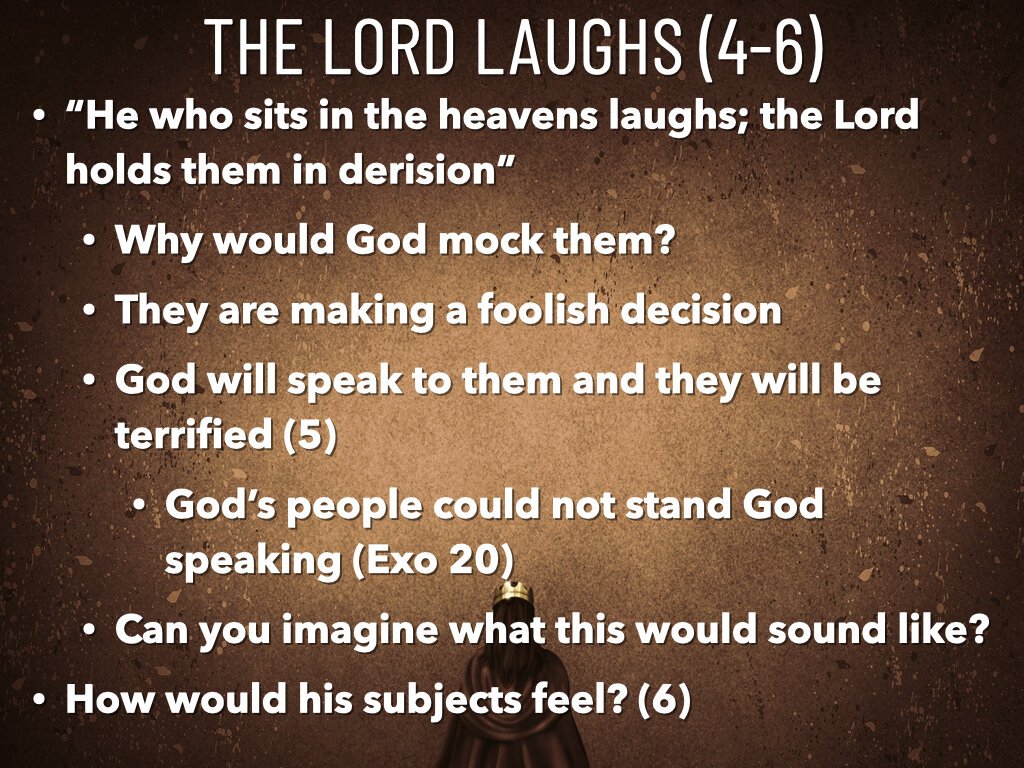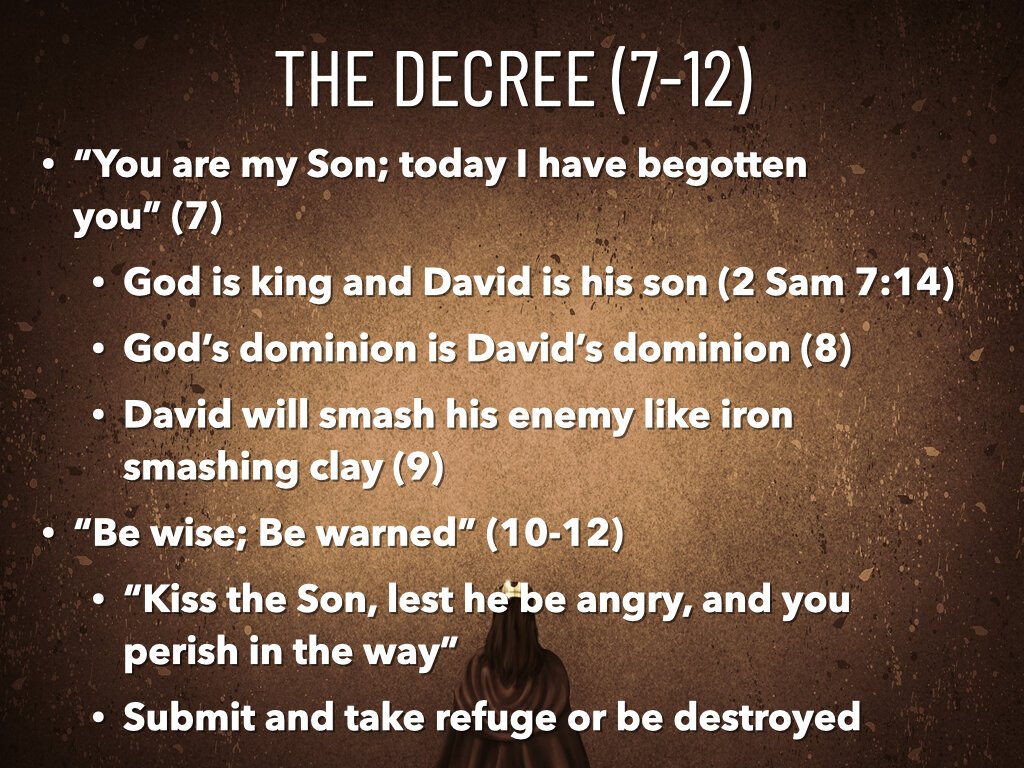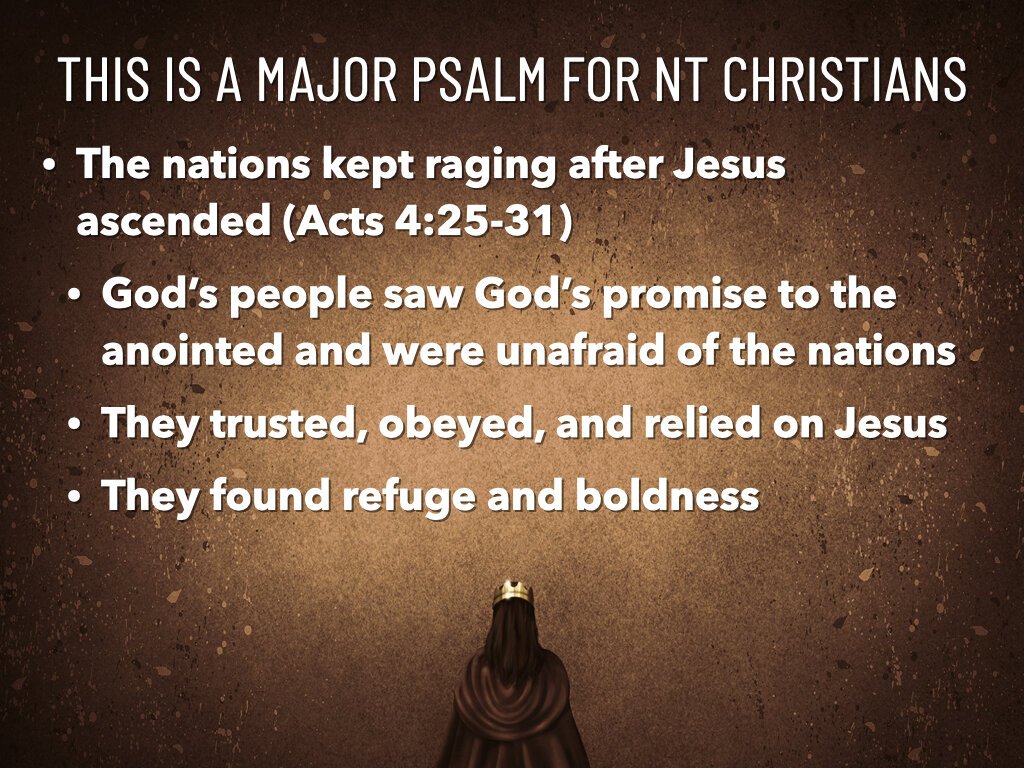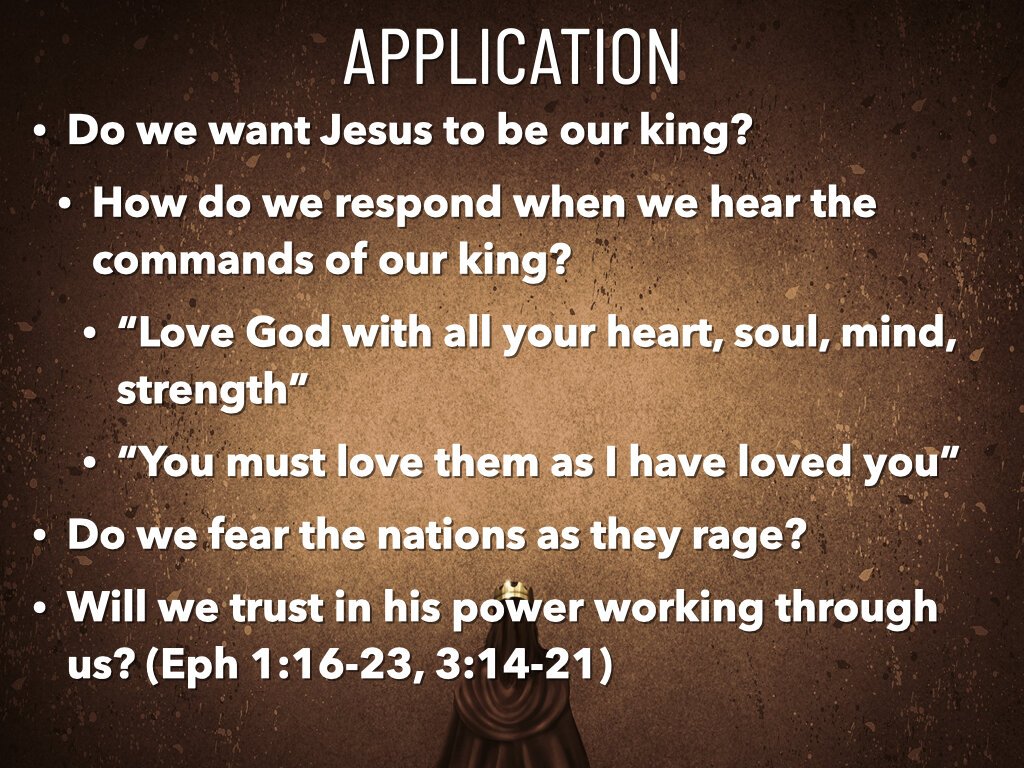Jesus is King (Psalm 2)
We may have movies that portray what life was like under a king, but I’m afraid we have no idea what that life would really look like. But being removed from those times, makes it hard for us to really grasp the concept we find in Psalm 2. We will try to understand it together today.
Psalm 2 (ESV) --- 1 Why do the nations rage and the peoples plot in vain? 2 The kings of the earth set themselves, and the rulers take counsel together, against the Lord and against his Anointed, saying, 3 “Let us burst their bonds apart and cast away their cords from us.” 4 He who sits in the heavens laughs; the Lord holds them in derision. 5 Then he will speak to them in his wrath, and terrify them in his fury, saying, 6 “As for me, I have set my King on Zion, my holy hill.” 7 I will tell of the decree: The Lord said to me, “You are my Son; today I have begotten you. 8 Ask of me, and I will make the nations your heritage, and the ends of the earth your possession. 9 You shall break them with a rod of iron and dash them in pieces like a potter’s vessel.” 10 Now therefore, O kings, be wise; be warned, O rulers of the earth. 11 Serve the Lord with fear, and rejoice with trembling. 12 Kiss the Son, lest he be angry, and you perish in the way, for his wrath is quickly kindled. Blessed are all who take refuge in him.
A Foolish Plot (1-3)
In this Psalm, the nations are raging against the Lord and against his anointed. The anointed one is a phrase used for the king of Israel. Saul was the first “anointed one” in the Old Testament, followed by David and his descendants. The word anointed is the same word for Messiah throughout the Bible. So this is what we would call a Messianic Psalm that obviously points to Jesus. But before we jump to Jesus, let’s consider this text in its original context.
Notice how all of this is worded. The wording is significant. The nations, those surrounding Israel, are wanting to rebel against the anointed king of Israel and stop him from ruling over them. They are plotting or meditating (it’s the same word) in vain. They are taking counsel together. These are ideas that were mentioned in Psalm 1, which we looked at last month. This Psalm is connected to the first Psalm as they each serve as an introduction to the Psalter. Why are they raging, and why are they plotting? They want to “burst their bonds apart and cast away their cords from us.” They are plotting to overthrow the authority that is holding them down. That is the way they view authority. Authority is just something that ties us down and keeps us from enjoying the blessed life. In the days of David and Solomon, the nations around Israel were subject to Israel. They paid tribute to the king. Occasionally they would rise up against the king of Israel because they want to be free from the tribute they owed him. They considered the king’s rule to be oppressive. These nations are seeking temporary blessings that might come by overthrowing the authority of their king without considering how evil it is for them to do so.
Saul was the original anointed one, but Saul eventually became an evil and oppressive king. He sought to kill David out of jealousy. When David was given opportunities to kill Saul, we see him refuse to lift up his hand against Saul. Saul was trying to kill David, but David refused to touch him even when others were encouraging him to. Why not? Why wouldn’t he kill Saul? Saul was David’s king. Even though Saul was doing great evil, David loved Saul because he loved and feared the Lord. David had reverence and respect for the position that God has given to Saul. So he even put to death the Amalekite who seemed proud to have killed Saul and deliver the crown to David. There was a respect for the position.
Throughout David’s reign, there were many attempts to overthrow him. From the start, the northern 10 tribes rose up against David. Later, after Israel had joined with Judah under David’s rule, one of David’s sons, Absalom, rose up against him. There were many attempts to overthrow God’s anointed, but did you notice how God says they are rising up against him and his anointed? The two are inseparable. These rebels probably only feel as though they are rising up against the king of Israel. However, the Psalmist is quick to point out that they are rising up against the one whom the Lord has explicitly chosen to anoint as king. This is a significant offense and evil that God will not allow.
The Lord Laughs (4-6)
As the nations rise up against the Lord and his anointed notice how scared God becomes. He is terrified. Verse 4 says, “He who sits in the heavens laughs; the Lord holds them in derision” That idea of derision is like taunting or ridiculing the nations. There is nothing man can do that will terrify God. Imagine God listening to what they are planning to do to overpower the God of the universe. This laughter is not an attempt to show God as cruel, but attempting to show how useless and foolish these nations have become. It is foolish to resist and rebel against God or the authoritative figure that he has placed over them. This is the God of Israel. He has brought plagues down on Egypt, parted the Red Sea, brought his people through the promised land, and conquered all of their enemies for them.
After laughing at them, verse 5 says that God will, “Speak to them in his wrath and terrify them in his fury.” This reminds me of when God spoke to his people at Mount Horeb (Exodus 20:18-19). The earth quaked, and all the people were terrified. They decided that they needed someone to stand between them and God so that they did not have to hear God speak. Moses served in this role for them because they could not handle God’s speech. But that was just God speaking his 10 commandments to his people. That was his friendly voice. Can you imagine what the words of wrath would sound like? All that God has to do to terrify man is speak. His words are enough...
In verse 6, God says, “I have set my king on Zion, my holy hill.” He has chosen Zion to be his mountain, and he has chosen his anointed one to be his king. All of the nations must bow down in submission. Think about how these words would affect the subjects of the Lord’s anointed. Would anyone be tempted to say something against the anointed one? These words should give God’s people comfort. Our God is not terrified by the nations. We might be. We might think that they could rise up and destroy us. But God just says, “This is my king and my place. If you want to mess with him or my city, you will be messing with me.” How would this make the subjects of the Lord and his anointed feel? Wouldn’t that give a feeling of safety that is unparalleled?
The Anointed Decree (7-9)
Verse 7 transitions to the words of the anointed one. He says, “I will tell of the decree: The Lord said to me, ‘You are my Son; today I have begotten you.’” This idea of God calling the king his son is coming directly out of the Davidic promise of 2 Samuel 7:14 where God tells David about his offspring saying, “I shall be to him a father and he shall be to me a son.” God is portraying himself as the king of the earth. He is not only creator. He is also the ruler. For David or Solomon or whoever to be called the Son of God in this context is implying a share in the authority of God. The king would often set up his son to rule over his dominion even while he was still living. This is what God has done.
Think about his dominion. Specifically, in verse 8, God decrees that he has established his anointed to take over the rule of the nations of the earth and to take possession of everything in the earth. He has given his king the authority to smash all who rise up against him like an iron rod would smash a clay pot. Imagine how much damage a clay pot can do to an iron rod or scepter. This is the way God portrays his king. No one could harm him unless the Lord allows it. The evil kings of the earth will not succeed.
The Final Warning (10-12)
Verses 10-12 exhort the kings who are raging and plotting to choose wisdom before it is too late. They must turn from their evil schemes, serve the Lord with fear, and rejoice with trembling. God is giving them a chance to change their ways. He is allowing them time to consider this notion of rebellion. If they will stop serving themselves and turn to serve the king with fear and trembling, they will be given reason to rejoice, and they will find refuge. But they must pay homage to the king and bow in submission. Most translations say, “Kiss the Son, lest he be angry.” The idea here is that if you humbly ask for mercy, you will find it. The king will not punish your foolishness. However, if you are too proud to bow down and kiss the feet of your king with apologies, you will not make it. You will not experience the blessed life because your foolish heart is darkened, and you are still trusting in yourself rather than the word of the Lord.
The King Is Jesus
In the New Testament, we see that the king and kingdom imagery is heavily relied upon. Jesus comes onto the scene, talking about the kingdom of God and the kingdom of heaven. He also starts calling God his Father and shows himself to be the one who has been given authority over nature and authority over sickness. Jesus gives us to picture that he is the Son of God because God has given him dominion. But when the nations rage against Jesus, he dies. The people were plotting to overthrow the Son of God. They came up with a scheme to have the Romans put him to death, and they succeed. Why? In the book of John, we read that Jesus was taken before the Roman governor, Pilot, and questioned. In John 18:36, Jesus said, “My kingdom is not of this world. If my kingdom were of this world, my servants would have been fighting, that I might not be delivered over to the Jews. But my kingdom is not from the world.” Then in John 19:10-11 Pilot said to Jesus, “Do you not know that I have authority to release you and authority to crucify you?” Then Jesus answered him, “You would have no authority over me at all unless it had been given you from above.” The kingdom’s authority belongs to God even while Jesus was being crucified. He had a power that is beyond our comprehension, but he let the nations do what they planned to do. Why? Because he knew that their plans would only work against them and for his people.
In the New Testament, we are given a picture of our king and his kingdom. It is not a kingdom, and he is not a king like anything we have ever seen before. Our king is a servant and not an evil oppressor. Our king loves his people and wanted to show them the nature of his power so that they don’t have to be afraid when the nations rage against them. When do the nations ever stop raging and plotting against God and the authority of his king?
Using This Psalm In The NT
What do the subjects of King Jesus think about this Psalm? This Psalm is referred to a few times in the NT, but I want to look at one instance in particular. In Acts 4, Peter and John stood up to the Jews who put Jesus to death and were released from prison. Then, for some reason, Psalm 2 comes to their mind. Listen to what they say...
Acts 4:25--31 (ESV) --- 25 who through the mouth of our father David, your servant, said by the Holy Spirit, “‘Why did the Gentiles rage, and the peoples plot in vain? 26 The kings of the earth set themselves, and the rulers were gathered together, against the Lord and against his Anointed’--- 27 for truly in this city there were gathered together against your holy servant Jesus, whom you anointed, both Herod and Pontius Pilate, along with the Gentiles and the peoples of Israel, 28 to do whatever your hand and your plan had predestined to take place. 29 And now, Lord, look upon their threats and grant to your servants to continue to speak your word with all boldness, 30 while you stretch out your hand to heal, and signs and wonders are performed through the name of your holy servant Jesus.” 31 And when they had prayed, the place in which they were gathered together was shaken, and they were all filled with the Holy Spirit and continued to speak the word of God with boldness.
Peter and John point to this Psalm, and God’s defeat of Jesus’ enemies for encouragement. They recognized that the nations had raged against their king, and their king was able to use his enemies to accomplish his will. So now they are asking God to work through the nations that are raging against them. They don’t have to be afraid of anything because they can find success even as they are put to death. Jesus has power over death. He has taken away its sting.
Using This Psalm Today
What does this have to do with us, though? First, we see that the nations never stopped raging against the Lord and his anointed. There is a constant rebellion going on in this world. No one wants to obey the commands of the king. They see those commands as too restrictive, and they want to break out, spend their money on what they want to spend their money on, lie, cheat, take advantage of people and hurt them for their own gain, and live whatever kind of life they want to live. But what about us? Do we ever rebel against the commands of our king? Anyone who refuses to obey the king is his enemy. We can become so concerned with our happiness in this life and fulfilling our own desires that we fail to think about the king and his ambitions. If we are a subject of the king, we must be loyal to his cause and seek to obey his commands, even at the expense of our comfort. If the king says, “Go and make disciples of the nations that are raging against me,” we cannot say, “I will go as long as it fits into my schedule.” If the king says, “You must love them as I have loved you,” we cannot say, “But they were mean to me!” If the king says, “Be holy as I am holy,” we cannot give in to the temptations of the rebellious nations around us. Are we the king’s enemies? Are we utterly obsessed with ourselves and our own identity? People who want to pursue their own glory or exalt themselves are standing against the king. No man can exalt himself over the king and live. He will dash his enemies to pieces! Our king was the most humble man who ever lived, but he was given more power than any man who has ever lived.
With Jesus as our king, we find strength to overcome our enemies like those Christians in Acts. We know that the nations will rage against us, but we also know that God is on our side fighting for us. We are sons and daughters of the king. He makes us rulers to conquer our enemy with love and compassion. They may kill us, but we gain the overall victory like our king. Understanding this kingship idea helps us find greater encouragement as we study the New Testament. For Example, notice how Paul uses the position of Jesus to encourage the church at Ephesus.
Ephesians 1:16--23 (ESV) --- 16 I do not cease to give thanks for you, remembering you in my prayers, 17 that the God of our Lord Jesus Christ, the Father of glory, may give you the Spirit of wisdom and of revelation in the knowledge of him, 18 having the eyes of your hearts enlightened, that you may know what is the hope to which he has called you, what are the riches of his glorious inheritance in the saints, 19 and what is the immeasurable greatness of his power toward us who believe, according to the working of his great might 20 that he worked in Christ when he raised him from the dead and seated him at his right hand in the heavenly places, 21 far above all rule and authority and power and dominion, and above every name that is named, not only in this age but also in the one to come. 22 And he put all things under his feet and gave him as head over all things to the church, 23 which is his body, the fullness of him who fills all in all.
Ephesians 3:14--21 (ESV) --- 14 For this reason I bow my knees before the Father, 15 from whom every family in heaven and on earth is named, 16 that according to the riches of his glory he may grant you to be strengthened with power through his Spirit in your inner being, 17 so that Christ may dwell in your hearts through faith---that you, being rooted and grounded in love, 18 may have strength to comprehend with all the saints what is the breadth and length and height and depth, 19 and to know the love of Christ that surpasses knowledge, that you may be filled with all the fullness of God. 20 Now to him who is able to do far more abundantly than all that we ask or think, according to the power at work within us, 21 to him be glory in the church and in Christ Jesus throughout all generations, forever and ever. Amen.
Conclusion
Psalm 2 is the ultimate example of how those who rage against God will be dealt with. God has placed his king over all of the nations of the earth to rule over the kingdoms of men. This otherworldly kingdom is not a democracy. If we line ourselves up with the enemies of the king, we will be destroyed. If we want to live a blessed life, we will not join the mockers, we will join those who submit and take refuge in the king. Not only does he delight in the law of the lord and meditate on it day and night, but he also bows in submission to the Lord’s anointed. The blessed man understands the rule and the authority of God. He knows that the creator of all things rules over all things and that he has established his anointed to rule over us.

